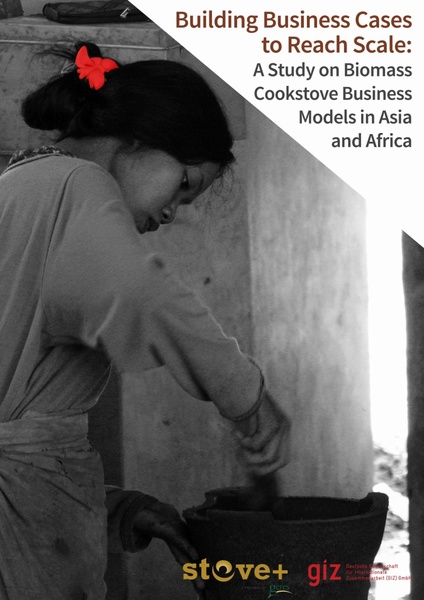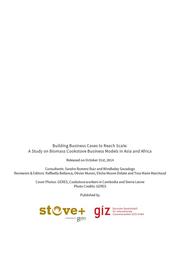File:Building Business Cases to Reach Scale.pdf
 Size of this JPG preview of this PDF file: 424 × 600 pixels. Other resolution: 170 × 240 pixels. |
Original file (2,480 × 3,507 pixels, file size: 0 bytes, MIME type: application/pdf, 97 pages)
Summary
| Description |
English: A study to help cookstove business models across Asia and Africa
In 2014, 2.5 billion people rely on biomass to cook and heat their home. Worldwide, initiatives have been developed to produce and spread improved biomass cookstoves. This little and simple devices can help the poorest to have access to a cleaner and more efficient energy that reduces health risks, helps mitigate climate change and improves livelihoods. Today, in the world, businesses that develop those type of stoves experience some difficulties to survive because of their main funding source, namely Carbon Finance that is slowing done. Thus, to propose solution to these businesses, a study is carrying out: “Building Business Cases to Reach Scale: A study on biomass cookstove business models from Asia and Africa”. To find tracks to develop their activities and to provide a clear, concise and accurate understanding of the business model to investors and funders, GIZ HERA and StovePlus – 2 organizations that used to work on the field in this sector for decades - have worked together during one year to study in-depth 8 cookstoves business models across Asia and Africa: Cambodia, Bangladesh, India, Kenya, Ghana, Burkina Faso where the well-known organizations work on the topic for years. The study was carried out by Sandra Romero Ruiz, Independent Consultant in Agriculture and Environment, Elisha Moore-Delate, Cookstove Specialist, Tina Marie Marchand, StovePlus Research and Advocacy Officer, and Windbaley Savadogo, Business Specialist and Independent Advisor. With 100 in-person interviews, direct field observations, focus groups and two regional workshops (Phnom Penh, Cambodia and Accra, Ghana), researchers were able to gather a large amount of firsthand data and recommendations. From these data, they highlighted evidences which show the importance of investing directly in stove value chains, especially at the production level (e.g. on training, tools & equipment for stove producers). Quality control through stove standards, labels and certifications, as well as public awareness efforts were also identified key areas to invest in. Market maturity was found to be a very important factor in considering where, when and how to invest in a cookstove business. For example, raising awareness on improved cookstoves is an essential activity for successful stove dissemination and those entering immature markets invest heavily in this area, both in terms of time and resources. Comparatively, stove businesses entering a more mature market tend to focus their investments on product development, standardization and marketing. A variety of financing mechanisms were seen, such as Official Development Assistance (ODA), private loans, carbon finance, awards, etc. And carbon finance played a very important role in the ability to scale-up cookstove businesses. Thus, the access to finance is still vital for the development of cookstove businesses and the sector, and direct investments into cookstove value chains have made stoves more accessible to end users. However, the study also explores the very interesting case of Cookswell Jiko; a cookstove business that was able to reach scale without any financial assistance. Finally, it’s important to highlight that despite a shift towards more market-led approaches, donors are still very relevant and have an important role to play in the development of the cookstove sector. In particular, market actors are calling upon development agencies and governments to lead large-scale, national level awareness raising efforts on the impacts associated with inefficient cooking, in particular the adverse effects of Indoor Air Pollution (IAP) on human health. |
|---|---|
| Source | |
| Date |
2015-01-21 |
| Author |
StovePlus and GIZ-HERA |
| Permission |
See license tag below. |
Licensing
|
File history
Click on a date/time to view the file as it appeared at that time.
| Date/Time | Thumbnail | Dimensions | User | Comment | |
|---|---|---|---|---|---|
| current | 10:29, 21 January 2015 |  | 2,480 × 3,507, 97 pages (0 bytes) | ***** (***** | *****) | User created page with UploadWizard |
You cannot overwrite this file.
File usage
The following page uses this file:





















